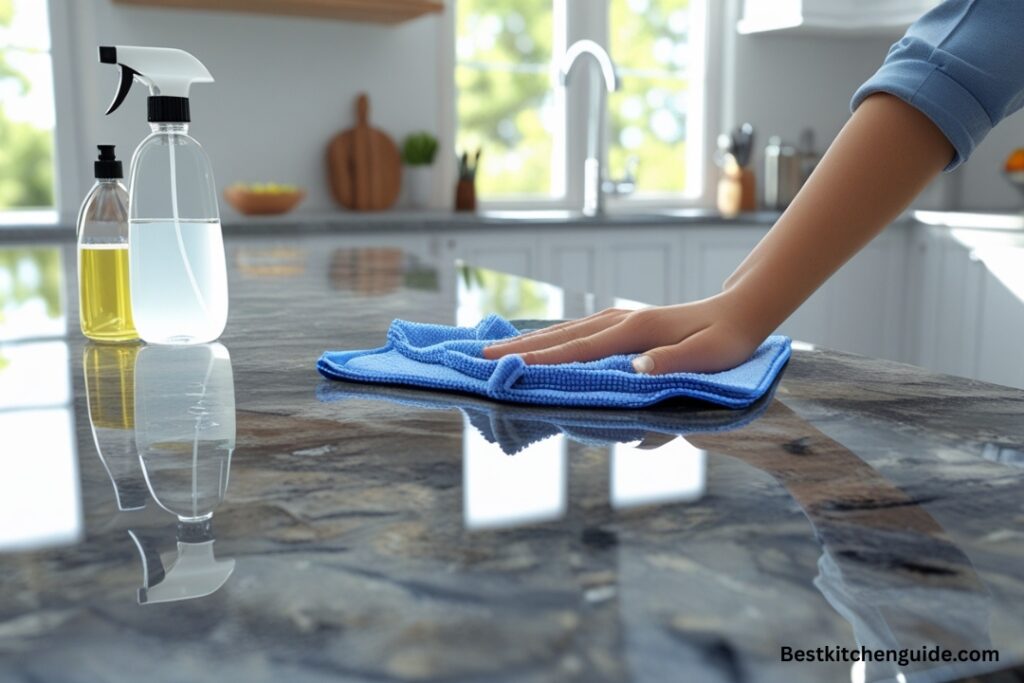use a mixture of warm water and mild dish soap on a soft cloth for daily cleaning. then disinfect with alcohol and water. Rinse well and dry to keep your counters streak-free.

Granite countertops instantly elevate the look of your kitchen or bathroom—but are you cleaning them the right way?
Using the wrong products can damage their shine, dull their beauty, or even lead to costly repairs.
Granite is a natural stone known for its elegance, strength, and resistance to heat and scratches. But its porous nature means it’s vulnerable to staining and etching if not properly cared for.
Many homeowners unknowingly use harsh chemicals or abrasive tools that slowly degrade their granite over time.
Imagine countertops that stay gleaming and smooth for years—without expensive restoration. With just a few simple cleaning habits, the right products, and occasional sealing, your granite surfaces can stay as beautiful as the day they were installed.
From daily cleaning to deep stain removal, this complete guide gives you all the tools and techniques to care for your granite the smart way.
Read on to learn the best ways to clean, disinfect, and protect your granite countertops. Whether you’re doing everyday wipe-downs or tackling tough stains, we’ll show you how to do it safely—step by step.
Explore more cleaning tips and kitchen care advice on our Best Kitchen Guide.
Granite is a natural stone formed under immense heat and pressure over millions of years. Though incredibly durable, granite is also porous, which means it can absorb moisture, oil, and other liquids if not properly sealed. If not cleaned correctly, this porosity makes it vulnerable to staining, etching, and bacterial growth.
Using common household cleaners like vinegar, bleach, or ammonia can break down the protective sealant and leave the stone susceptible to damage. Understanding what to use and avoid is critical to preserving your investment.
Before discussing cleaning routines, it is helpful to understand how granite differs from other surfaces, such as quartz, marble, or laminate.
Granite is a natural stone with varying levels of density and porosity depending on its mineral composition. While it is more scratch- and heat-resistant than marble, it must be sealed periodically to protect against staining.
Unlike engineered stones such as quartz, granite is not inherently stain-proof or antimicrobial. Granite countertops demand a consistent care routine to stay safe and hygienic, especially in high-traffic kitchens.
Keeping your granite countertops clean daily is not tricky, but it does require gentle care. A basic wipe-down once or twice daily can help prevent residue buildup and protect your countertops from long-term damage.
Start by removing loose crumbs or debris with a soft, dry cloth or paper towel. Use a microfiber cloth, as it lifts dust and particles without scratching the surface.
Next, prepare a simple cleaning solution by mixing warm water with a few drops of mild dish soap. Dip a clean cloth or sponge into the solution and gently wipe the surface. Avoid using abrasive scrubbers, which can scratch the stone or wear down the protective sealant.
After wiping, use another clean, damp cloth to rinse any soap residue. Finally, buff the countertop dry with a dry microfiber towel to prevent water spots and maintain that polished finish.
This process removes surface dirt and helps prevent bacteria buildup from food preparation and spills.
When cleaning granite, always use pH-neutral or stone-safe products. These include:
If you prefer commercial cleaners, choose a product specifically designed for granite or natural stone. These solutions are formulated to clean without compromising the integrity of the stone or the sealant.
Never use the following products on granite:
Natural cleaners like vinegar can slowly erode the sealant and dull the shine over time.
Disinfecting your granite countertops is essential, especially after handling raw meat or seafood or during cold and flu season. However, most disinfectants on the market contain harsh chemicals that are not granite-friendly.
The safest way to disinfect granite is by using 70% isopropyl alcohol. You can create a homemade disinfectant spray by mixing equal parts of rubbing alcohol and water in a spray bottle. Optionally, add a few drops of dish soap for extra cleaning power.
Spray the solution over the granite surface and let it sit for 3–5 minutes. This dwell time is essential because it allows the alcohol to kill bacteria and viruses effectively. Afterwards, wipe the area with a clean, damp cloth and dry it with a towel.
This method disinfects the granite without stripping its protective seal.
Despite granite’s strength, it is not completely stain-proof—especially if the sealant has worn off. Stains can come from various sources, including oil, coffee, wine, or water. The good news is that most stains can be removed with the right approach.
Here is how to deal with some of the most common granite stains:
Use baking soda and water paste. Spread it over the stain, cover it with plastic wrap, and tape down the edges. Leave it for at least 12–24 hours before wiping clean. Repeat if necessary.
Make a paste using baking soda and hydrogen peroxide. Apply it as described above, using plastic wrap to moisten the area. Let it sit overnight, then clean and rinse.
Use a commercial rust remover specifically designed for stone. Avoid generic rust removers, as they may contain acids that damage granite.
Buff the area gently with a dry cloth. If the spot remains, apply a few drops of hydrogen peroxide to a soft cloth and rub lightly.
Test your method on a hidden area when treating any stain to ensure it does not discolour or damage your granite.
Granite countertops are typically sealed when installed, but this seal does not last forever. Liquids and oils can seep into the stone without a proper seal, leading to permanent stains.
Sealing your countertops once every 12 to 24 months is generally sufficient, though heavily used areas may need sealing more frequently.
Over time, granite can lose its lustre due to soap film, mineral deposits, or simply from frequent use. Luckily, you can restore that shine without hiring professionals.
For a quick polish, mix 1 part isopropyl alcohol with 3 parts water, add a drop of dish soap, and spray it over the surface. Buff with a dry microfiber towel until the surface shines.
You can also purchase granite polish sprays formulated to enhance sheen without leaving waxy buildup behind.
Avoid wax-based polishes, which can create a dull film or attract dirt and residue over time.
Proper maintenance is not just about cleaning but also about protecting your granite from unnecessary wear and tear. Here are a few easy-to-follow tips to help keep your countertops looking beautiful for years:
These habits, though small, can make a big difference in the long-term condition of your granite.
Even well-meaning homeowners can make mistakes that damage their countertops over time. Here are a few pitfalls to steer clear of:
Granite may be strong, but improper cleaning methods can still take a toll.
Granite countertops are valuable additions to any home, offering durability, sophistication, and style. However, they also require thoughtful care and maintenance to stay in top shape.
Properly cleaning granite countertops using safe solutions, gentle tools, and smart techniques can protect your surfaces from damage, maintain their beauty, and extend their lifespan for decades.
From daily cleaning routines and disinfecting tips to stain removal and sealing advice, caring for granite does not have to be complicated. All it takes is a little consistency and the right know-how.
Take care of your granite countertops; they will continue to be the sparkling centrepiece of your kitchen or bathroom for many years.

Whether you’re selling or staying, everyone can get something out of a kitchen update. Learn why we consider this renovation the Most Valuable Project of 2025 and how to stay on budget.

Hi, I’m Kyler Halvorson—a home kitchen advisor with over 15 years of experience helping beginners design simple, functional, and efficient kitchens. I specialize in providing practical tips, expert guidance, and trusted tools to help you cook with confidence from day one.
Best Kitchen Guide offers expert tips and product reviews to simplify your cooking experience. From cookware to appliances, we help you build a smart, efficient kitchen.

Best Kitchen Guide offers expert tips and product reviews to simplify your cooking experience. From cookware to appliances, we help you build a smart, efficient kitchen.
Copyright 2025 Best Kitchen Guide, all rights reserved .